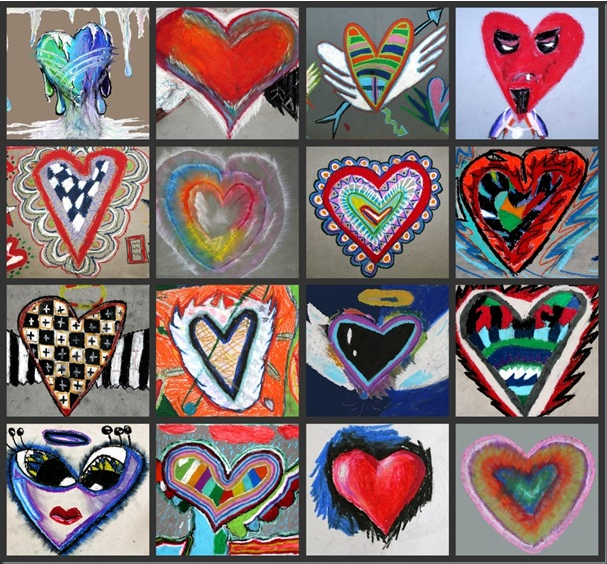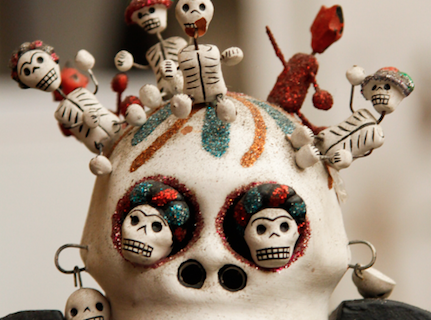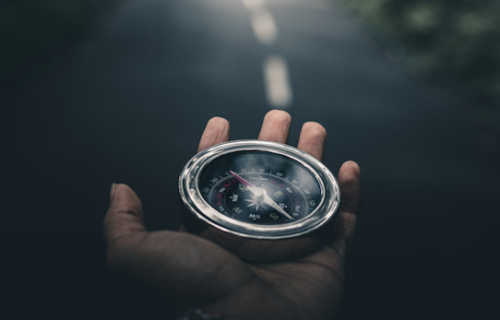
Earth-based Tools for Allaying Emotion Contagion
Emotions are…older than spoken language, and simply put, they are smarter than words, they’re deeper than any technique, and they can help you in ways you cannot imagine…Emotions are not created out of thin air, and they’re not created by your thoughts (emphasis mine); emotions have evolved over millions of years to help you understand and respond to the world. Emotions exist within you, and they are evoked, not created, by specific stimuli.
-Karla McLaren
Recently, I was traveling and watching the news from one of the busiest airports in the United States when I saw that the World Health Organization had declared COVID-19 a global pandemic. As my trip abroad unfolded, I was enveloped in the trauma of the world around me as everything screeched to a halt. It was surreal. The airports were nearly empty: folks avoided eye-contact with one another and stared at screens broadcasting the news in terror. Although it was an intense experience for me as a natural empath, it was also an opportunity to put my spiritual tools into practice in a way I haven’t quite had to before. I am aware that it may be “too soon” for some to read an article on emotion contagion. Ultimately, I decided to write this piece because I am concerned about the hysteria that has been whipped up by the media and how it is affecting peoples’ mental and emotional health. We know that sustained fear and worry lower immune responses and so finding a way to stay calm through this is essential. Although we cannot control the world outside of us, we can command what we put our attention on. Though I am not taking this “lightly” (I have auto-immune illnesses myself) and I understand the importance of containing the virus, I don’t see the efficacy of encouraging sustained panic. Though there are no bad emotions, when this state doesn’t resolve itself naturally, it can turn into a more serious problem: Post-Traumatic Stress Disorder (PTSD).
In recent articles I created for Pagan Pages Magazine, I spoke at length about the ways we are being called to evolve spiritually as humans and the importance of coming back to a state of balance with ourselves, others, and Mother Nature. As I write, the beginning of the crumbling of entrenched, unsustainable institutional structures is evident all over the news and social media feeds. Collectively, we humans are being asked to “up” our intra- and inter-personal intelligence skills in order to better cope with the rapidly changing times we are living in. These times require us to be able to be emotionally regulated and agile, as well as to hone our ability to empathize with others while we make the most intelligent decisions possible.
With the mass world panic around the COVID-19 virus, we have had a good example of what happens when our emotional intelligence skills are not honed. In psychology, “the phrase ‘emotion[sic] contagion’ embodies the idea that humans synchronize their own emotions with the emotions expressed by those around them, whether consciously or unconsciously.” (Wikipedia) The Internet and the use of social media to communicate news have exponentially increased this phenomenon so that now, emotion contagion can literally spread all around the world within seconds, whereas in other times, it might have taken months or years for news to reach the other side of the globe. Although there are pros to the Internet, this is a rather large con in a world where we don’t understand the power of emotions to affect the decision-making process.
Sadly, we don’t learn about our emotions or how to work with them in school or in most families; they are simply not valued. In our society, emotions are seen as a nuisance and a liability. We have been programmed to believe that emotions are illogical and unreliable. However, nothing can be further than the truth. Researcher Karla McLaren has done a brilliant job of mapping out the gift of each emotion and its critical role in rational and clear decision-making. In her book The Art of Empathy, McLaren emphasizes that “[e]motions are action-requiring neurological programs, and, as such, they bring you specific gifts and skills…Emotions are intrinsic aspects of your most basic cognitive abilities and your intelligence.”
For example, researchers have studied people who have had brain injuries impeding their ability to feel fear. These people are simply unable to make good decisions. It turns out that fear connects us to our instinctual knowing about situations so we can make good choices. McLaren goes on to say that “[i]f you and fear are working nicely together, you’ll calmly and instinctually identify hazards and safety, though you may have no idea that you’re working with fear, because you won’t feel obviously afraid.” Gavin De Becker’s book The Gift of Fear also does a wonderful job of sharing case studies of people who have experienced violence and instinctively knew that something was “off” but hesitated in taking the appropriate action at the right time because they didn’t trust what they were perceiving. Similarly, he shares how people were able to escape abusive and life-threatening situations by following their gut instinct even though it was a “feeling” and nothing they could pin down rationally or logically.
Karla McLaren helpfully states that we sense emotions at different intensities depending on how good our personal boundaries are and how well we are able to identify what we are feeling in order to take the appropriate action. People with high intrapersonal intelligence are in touch with what is going on within them so that the emotion doesn’t have to become so intense that it becomes harder to respond clearly. Folks who also have high interpersonal intelligence are able to put themselves in another’s shoes so they can skillfully work with the emotions of others to find good solutions to conflicts and challenges. Folks who are best able to navigate life when emotion contagion is present are those who have spent time practicing emotional regulation skills and have, therefore, become good at staying calm during storms. These folks also see emotions as allies–not enemies–and are therefore able to help others come back to balance in a crisis. As highly relational beings, humans are wired for connection and we have evolved to co-regulate when life throws us curveballs:
In psychology, co-regulation is defined most broadly as a ‘continuous unfolding of individual action that is susceptible to being continuously modified by the continuously changing actions of the partner’… Co-regulation is often applied in the context of emotions. In this sense, the emotions of each individual … are constantly in flux, depending on the emotions and behaviors of the [other]. If emotion co-regulation is in effect, the result will be a decrease in overall emotional distress.
-Wikipedia
As you can see, making clear-headed choices and maintaining inner balance in the presence of strong emotions are essential life skills to master if we are to live well. Although I highly recommend reading McLaren’s books and working with her tools, which do have some similarities to some psycho-spiritual practices, I want to add some ideas that are specifically earth-based here that I have used successfully as an empath to gain more equilibrium in my own life.
A decade ago, I created a sacred circle and “power spot” in the spirit world that I go to in my mind’s eye to do my healing work. I don’t invite anyone to that circle except for my ancestors, spirit guides, my High Self, and Spirit/Goddess/God. That circle represents my personal space and when I arrive there, I can see what state that space is in. If I am in chaos, I start by cleaning up the circle. I send any energy that is in there that is not mine to deal with out of the space (I control what stays and what goes unapologetically). If I am so ungrounded that I can’t sense what’s mine and what’s not, I call in my spirit guides to do that work for me. I sit and breathe until I feel more balanced. Then, once my circle is clean of externals, I sense what is going on inside me that needs attention. I sit with feelings as they arise and allow them to share their messages with me. I follow McLaren’s useful questions to support me in figuring out what is going on: If I am fearful I ask, “What is my intuition telling me?” Once I know what my gut is telling me, I can better see what action I need to take. I can’t control others do, but I can certainly be clear on what I need to do to stay healthy and well on all aspects of my inner medicine wheel: body, heart, mind and spirit.
As an energy worker, I also feel it’s important to remember that our bodies are intelligent, made to heal themselves in concert with nature. We have evolved with microbes in our environment for hundreds of thousands of years. Our thoughts impact our body’s ability to balance itself. I do regular scans of my body to see what thoughts, beliefs, and imbalances need to be transformed in order for healing to take place. Each evening before I go to bed, I release the tension of the day by breathing it into the earth for composting, do my self-forgiveness work, and set an intention for my dreamtime. This intention could simply be to have a healing or relaxing sleep. Since the body responds to all conscious and unconscious messages we send it, this can be an extremely useful tool in times of great tumult. This isn’t a long process and it makes a big difference.
There are other things we have been doing at our house to help maintain balance during this abnormally stressful time. Nature, thankfully, is always open for business and we’ve been on loads of hikes and walks, upholding the appropriate social distancing recommended by health officials. Folks in cities can hang out on their balconies or in their private gardens. “Research shows that outdoor air is a natural disinfectant. Fresh air can kill the flu virus and other harmful germs. Equally, sunlight is germicidal.” (Hobday) As a long-time shamanic practitioner, I have long utilized the healing powers of nature to keep me healthy. Even a short walk in nature helps to improve mood and bring greater clarity to troubling situations we are facing.
We can choose to limit media exposure at this time to reduce anxiety and gain perspective while also doing our bit to stop the spread of the virus. Although it’s good to stay informed using trusted sources, we don’t have to be on our devices 24/7 in order to do that (the mainstream media is designed to create a frenzy and we don’t have to play along with that game). With increased time at home, we run the danger of going into overwhelm and further isolating ourselves from the support that is all around us. Instead, spend time checking in on those you love via video chat, text, and email. Connect with the people who mean most to you. See if a neighbor needs a grocery run. Read the books you’ve always wanted to read, play with your kids, and make art. Share a laugh with someone.
There is also a call for those of us who are healthy and have knowledge of such things to do ceremony to help curb the impact of the virus. All over the world, people are doing healing dances, sending distance reiki, singing healing songs, and gathering online in prayer. It’s also important to remember all those who were living a precarious existence before the virus hit the world whose lives are threatened–not by the possibility of being sick, but by no longer being able to care for themselves and those they are responsible for. Those of us who are more balanced can offer our calm to help stabilize others while solutions are found. We are in unprecedented times where there is no map to guide us; we are collectively creating the new territory as we go. It’s good to stay mindful of what we are contributing as we dream in the new world.
Prayer for a Pandemic by Cameron Bellm
May we who are merely inconvenienced
Remember those whose lives are at stake.
May we who have no risk factors
Remember those most vulnerable.
May we who have the luxury of working from home
Remember those who must choose between preserving their health or making their rent.May we who have the flexibility to care for our children when their schools close
Remember those who have no options.May we who have to cancel our trips
Remember those that have no safe place to go.
May we who are losing our margin money in the tumult of the economic market
Remember those who have no margin at all.
May we who settle in for a quarantine at home
Remember those who have no home.
As fear grips our country, let us choose love.During this time when we cannot physically wrap our arms around each other,
*This article appeared in the April 2020 edition of Pagan Pages Magazine.
Let us yet find ways to be the loving embrace of God to our neighbors.
Resources
Book: “The Art of Empathy: A Complete Guide to Life’s Most Essential Skill” by Karla McLaren
Book: “The Language of Emotions: What Your Feelings are Trying to Tell You”
Book: “The Gift of Fear: And Other Survival Signals That Protect Us from Violence” by Gavin De Becker
Book: “Frames of Mind: The Theory of Multiple Intelligences” by Howard Gardner
Book: “Emotional Intelligence: Why It Can Matter More Than IQ” by Daniel Goleman
Article: Coronavirus and the Sun: A Lesson from the 1918 Influenza Pandemic by Richard Hobday
Article: “The Lifesaving Ingenuity of Panic and Terror” by Karla McLaren
Study.com: “What is Interpersonal Intelligence?”
Study.com: “What is intrapersonal intelligence?”


